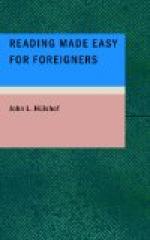Samuel Woodworth.
LESSON LI
THE VALUE OF TIME
The value of time has passed into a proverb,—“Time is money.” It is so because its employment brings money. But it is more. It is knowledge. Still more, it is virtue.
Time is more than money. It brings what money cannot purchase. It has in its lap all the learning of the past, the spoils of antiquity, the priceless treasures of knowledge. Who would barter these for gold or silver? But knowledge is a means only, and not an end. It is valuable because it promotes the welfare, the development and the progress of man. And the highest value of time is not in knowledge, but in the opportunity of doing good.
Time is opportunity. Little or much, it may be the occasion of usefulness. It is the point desired by the philosopher where to plant the lever that shall move the world. It is the napkin in which are wrapped, not only the talent of silver, but the treasures of knowledge and the fruits of virtue. Saving time, we save all these.
Employing time to the best advantage, we exercise a true thrift. To each of us the passing day is of the same dimensions, nor can any one, by taking thought, add a moment to its hours. But, though unable to extend their duration, he may swell them with works.
It is customary to say, “Take care of the small sums, and the large will take care of themselves.” With equal wisdom may it be said, “Watch the minutes, and the hours and days will be safe.” The moments are precious; they are gold filings, to be carefully preserved and melted into the rich ingot.
Time is the measure of life on earth. Its enjoyment is life itself. Its divisions, its days, its hours, its minutes, are fractions of this heavenly gift. Every moment that flies over our heads takes from the future, shortening by so much the measure of our days.
The moments lost in listlessness, or squandered in dissipation, are perhaps hours, days, weeks, months, years. The daily sacrifice of a single hour during a year comes at its end to thirty-six working days, an amount of time ample for the acquisition of important knowledge, and for the accomplishment of great good. Who of us does not each day, in many ways, sacrifice these precious moments, these golden hours?
Seek, then, always to be usefully occupied. Employ all the faculties, whether in study or in manual labor, and your days shall be filled with usefulness.
LESSON LII
THE STUDY OF CIVICS
Few people have the time to undertake a thorough study of civics, but everyone ought to find time to learn the principal features of the government under which he lives. We should know also of the way in which our government came into existence, and how this government is administered to-day. Such knowledge is necessary for the proper discharge of the duties of citizenship.




